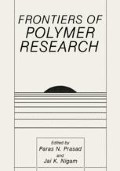Abstract
Thin films of conducting polypyrrole were prepared by chemical polymerization in solutions: by dipping polyethylene terephthalate film coated with polymethyl methacrylate (PMMA) into pyrrole monomers and then in FeCl3 aqueous solution. The oxidation potential of this solution, which has strong influence on the polymerization, was adjusted to appropiate value by adding suitable amount of FeCl2 to the solution before the reaction. In the suitable polymerization condition, the polypyrrole films obtained possess conductivity as high as 110 S/cm. In the case of long polymerization time, the SEM studies of the films indicated that polypyrrole was not only polymerized on the surface of PMMA, but also penetrated into PMMA to form a strong composite films. It was found that the polypyrrole films obtained in this work were very difficult to undope. This suggests that the prepared films can be used as a conducting surface for electrodeposition of metal on surface of plastic such as PMMA.
Access this chapter
Tax calculation will be finalised at checkout
Purchases are for personal use only
Preview
Unable to display preview. Download preview PDF.
References
K. Kanazawa, A.F. Diaz, W.D. Gill, P.M. Grant, G.B. Street and G.P. Gardini, Synth. Met., 1(1979/1980)329.
G.B. Street, T.C. Clarke, M. Krounbi, K. Kanazawa, V. Lee, P. Pfluger, J.C. Scott and G. Weiser, Mol. Cryst. Liq. Cryst., 83(1982)253.
G.B. Street, “Hand Book for Conducting Polymer,” T.A. Skotheim, Ed., Marcel Dekker, Inc., New York and Basel, 1986, Chapter 8 and references therein.
S. Machida, A. Techagumpuch and S. Miyata, Synth. Met., 31(1989)311.
S.M. Sze, “Physics of Semiconductor Devices,” Wiley -Interscience, New York, 1981. p. 30.
A.J. Bard and L.R. Faulkner. “Electrochemical Methods,” John Wileys and Sons, New York, N.Y., 1980, p. 51.
T. Yoshigawa, S. Machida, T. Ikegami, A. Techagumpuch and S. Miyata, Polym. J., 18(1986)95.
A.F. Diaz and J. Sargon, “Hand Book for Conducting Polymer,” T.A. Skotheim, Ed., Marcel Dekker, Inc., New York and Basel, 1986, Chapter 3 and references therein.
Author information
Authors and Affiliations
Editor information
Editors and Affiliations
Rights and permissions
Copyright information
© 1991 Springer Science+Business Media New York
About this chapter
Cite this chapter
Techagumpuch, A. (1991). The Preparation of Highly Conductive Polypyrrole Composite Film by Chemical Polymerization in Solution. In: Prasad, P.N., Nigam, J.K. (eds) Frontiers of Polymer Research. Springer, Boston, MA. https://doi.org/10.1007/978-1-4615-3856-1_35
Download citation
DOI: https://doi.org/10.1007/978-1-4615-3856-1_35
Publisher Name: Springer, Boston, MA
Print ISBN: 978-1-4613-6721-5
Online ISBN: 978-1-4615-3856-1
eBook Packages: Springer Book Archive

